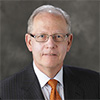Download PDF

By David W. Parke II, MD, Executive Vice President/CEO
I frequently am asked about how the Academy handles financial conflicts of interest (COI). Some members believe that public identification of potential financial COIs inevitably stifles the innovative science and technology needed to advance the profession, while others interpret Academy policies as permitting too much industry influence.
As we approach AAO 2014—a time when thousands of ophthalmic industry representatives and members interact—I’d like to clarify Academy policies and provide some perspective. First, this is not about the Physician Payment Sunshine Act, which concerns public reporting of individual physician relationships with industry.
Second, I’m addressing only financial COI here. We have policies in place to address the equally important issue of nonfinancial COI, but they are beyond the scope of this column.
Third, I believe that everyone agrees that some COIs must be disclosed and managed. For example, it would be wrong to have a clinical guidelines committee chair with a seven-figure COI—particularly if that COI could be viewed as influencing the guidelines.
The Academy, like many other medical societies, has developed guidelines and strict procedures to govern financial relationships with industry. The objective is to ensure that physicians and their professional organizations retain the trust and respect of the patient community to put first and foremost the best interests of patients—and not their own economic self-interest.
Concurrently, the process must not exclude from educational presentations or from leadership positions those who by virtue of their innovative spirit or professional productivity and reputation have developed collaborative relationships with companies.
Here are some of the salient points of current Academy COI policies:
• Leadership. The Academy believes that it is inappropriate to exclude from its Board of Trustees individuals with potential financial COI, as long as such relationships are disclosed to the board and members and COIs are managed as necessary. However, there are a very few positions that should be free of COI with the medical device and pharmaceutical industries. The CEO, president, president-elect, past president, and Ophthalmology editor-in-chief are barred from having such COIs.
• Educational presenters. The Academy adheres to the standards of the Accreditation Council for Continuing Medical Education (ACCME), which requires all presenters or contributors to continuing medical education programs to identify and characterize financial relationships. Any violations of these policies, such as apparent bias, are taken very seriously.
• The Academy itself. The Academy, apart from business transactions such as journal advertisements, accepts cosponsorships of educational programs from industry only when such cosponsorships comply with the guidelines of both the Council of Medical Specialty Societies and the ACCME. These guidelines put appropriate parameters around the interactions to make sure the sponsoring company has no influence on selection of topics or speakers. Industry sponsorship of CME is important: It promotes communication that leads to new investigations, clinical trials, and ultimately new devices and drugs that improve patient care. Transparent financial relationships help, not hinder, the process by providing a framework to ensure integrity.